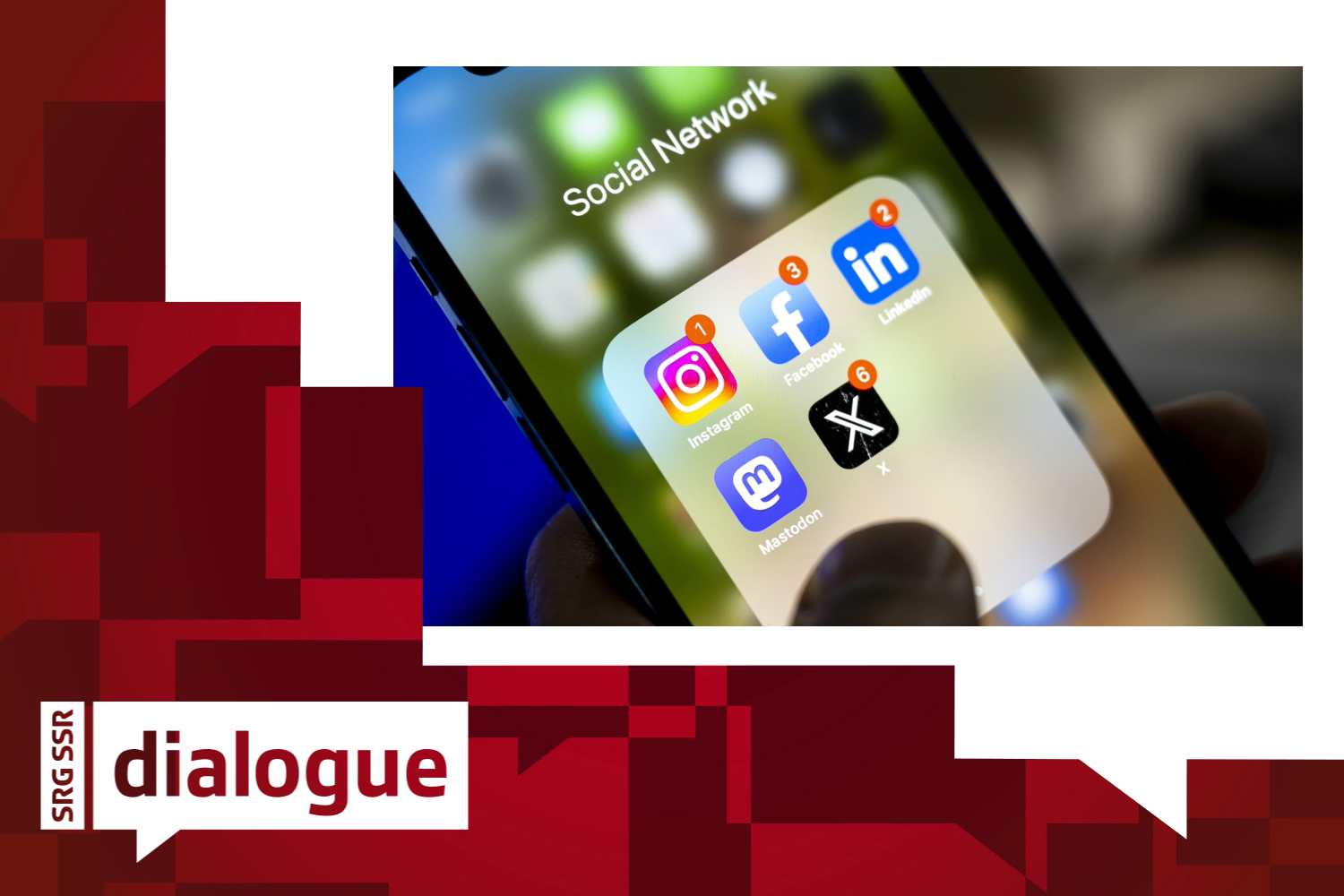‘It’s political’: why some people refuse to have a smartphone

Almost 20 years after the first iPhone arrived, not everyone is ready to go fully digital. We talk to a retired administrator, a journalist and a philosopher about the personal and political sides of smartphone-free life.
In the mid-1990s, as blocky-looking mobile phones were taking over the world, Beat Hasler opted out.
In his 40s at the time, Hasler was youth director at his local football club in Langenthal, canton Bern. “It was a big thing, 300 kids,” he says. “The parents always wanted to contact me about something. I knew that if I got a mobile, I’d never hear the end of it. So I didn’t get one.”
For three decades, as Nokia 3210s became iPhones, Hasler held out. Neither his work in banking and administration, nor his friends or family could sway him from the prize of resistance: self-determination, and freedom from the “absurd demand to always be available”.
In 2025, Hasler is a member of a rare species: people who prefer to live as offline as possible – or who at least don’t want to carry the online world around in their pocket. People who, like him, prefer face-to-face talks to QR codes and apps.

Stress at work, ‘nonsense’ online
Hasler’s position is not overtly political. Amid broader debates in Switzerland about the right to remain offline, for example, he “wouldn’t necessarily say analogue life needs to be protected as such – that’s a bit of a utopia”.
And on the personal level, he hasn’t had many problems in the past 30 years. One exception: to avoid online banking, he is currently switching to a smaller regional branch with in-person customer service. Generally however, he “always managed to get along fine”.

That said, Hasler, who is now 70 and retired, does worry about how some aspects of digitalisation affect society. One example is more stress at work. With emails just a click away, there is pressure to be constantly productive, he reckons.
Another is the amount of time people spend on social media. “There’s a huge amount of nonsense there,” he says. “And self-restraint has plummeted. Before WhatsApp or social media, you had to directly insult somebody or give them your opinion. When you can just write it, inhibitions disappear.” For news and current affairs, Hasler prefers his two daily newspapers.
Meanwhile, constantly scrolling young people – Hasler regularly looks after his three grandchildren – are at risk of being sucked into a “parallel world”, he thinks.
He worries that while much of what’s written online is “not reality” – disinformation, fantasy, deepfakes – it can become normal after a certain exposure to it. As such, he favours rules to protect children. “For example, banning smartphones in schools, or setting an age limit of 16 for owning one”.
Not just technophobes go Smartphone free
On this, Hasler is not alone: 82% of Swiss are in favour of banning smartphones in schools, a survey last year found. The Swiss government has since said it’s open to the possibility of a social media ban for under-16-year-olds; Australia took this step last year.
In general, while Hasler reckons his views are marginal in a society obsessed with technology, they might not be as marginal as he thinks.
As the below article describes, many Swiss are sick of social media, even if they continue to use them:

More
Poll: Swiss are fed up with social media
When it comes to children especially, people around the world are increasingly debating about how smartphones might be affecting mental health. Jonathan Haidt’s The Anxious Generation was a US bestseller in 2024, even if it was criticised for its methodology. The World Health Organization (WHO) is also worriedExternal link.
It’s not just children. The role of social media and artificial intelligence (AI) in boosting disinformation and populism is a common concern in democracies. Cutting down on screentime is coolExternal link. Even the “Luddite” label – named after the movement to destroy machinery in textile mills during industrialisation – is being re-claimed by people who want to slow the bulldozing advance of digital technology, particularly job-destroying AI.
In Hasler’s case, he moved from “abstinence to semi-abstinence” during the course of writing this article, when his children presented him with an unexpected gift: a simple Nokia to be used in case of family emergencies.
But he’s still an outlier. In 2025, it’s not just being without a phone that’s uncommon – it’s being without a smartphone.
This is also true for Hasler’s generation: a 2020 survey by the Pro Senectute group found that 69% of over 65s in Switzerland had a smartphone. And among all age groups, mobile digital use is basically ubiquitous, as a 2023 poll found:
Connecting to the natural world
Yet as more and more people try to escape the pull of being always online, sales of old-school “dumbphones” – like the type Hasler now has – have been booming, Swiss public broadcaster, RTS, reportedExternal link last year.
Bettina Dyttrich, a journalist with the left-wing Swiss weekly Wochenzeitung, is one such person.
Dyttrich, 45, says she never liked talking by phone, even as a child. Later, she realised it was important to her to not be permanently contactable. Finally, just a few years ago, she made a “concession” to friends: a simple offline phone.
A smartphone is however out of the question. In Dyttrich’s view, the shift to portable digital devices was a bigger rupture than the arrival of the web itself, and one she doesn’t want to follow.
“For me, the internet involves going home or to the office, sitting down, and switching on the PC,” she says. “I can live with that. What I can’t live with is when it’s on the bus, in the bedroom, everywhere.”

As a “nervous” person, constant influxes of information can be overwhelming, Dyttrich says. In order to feel balanced and do her job – writing feature articles, usually about ecological issues – she has to be able to concentrate and be in contact with nature.
“I need water, trees, mountains, animals, people. I don’t get how others are satisfied with an online image of these things. I need to feel that I’m physically here, that this river next to me has its source there. It’s about how we interact with space and place, and how they affect us,” she says.
And like Hasler, whose private instincts feed his views about technology and society, Dyttrich’s experience is not just personal.
For one thing, she worries about the consequences of people losing touch with the natural world. Biodiversity is shrinking, yet at the same time many people aren’t even aware of the existence of certain species. “You don’t miss the bird you never knew existed,” she says.
In the apparently endless digital realm, it’s also easy to forget about natural limits – which can be “stretched, but not gotten rid of completely”. In an economic system encouraging more and more consumption, including online, she fears people increasingly don’t see these limits.
Lack of a broad debate?
As such, while she realises that her individual choice to not have a smartphone doesn’t change anything, Dyttrich says her motivation is clear: “it’s political”.
However, she misses a wider societal debate. Discussions in schools are one thing, in her view – and like Hasler, she is in favour of clearly defined “analogue” moments in the classroom.
But more broadly, people are often afraid to talk about the issue, she reckons – because they worry about disrupting consumer habits, appearing reactionary, or facing up to their digital addiction. “I know I’m lucky that I’m not susceptible to that,” Dyttrich says. “But I often hear people saying they suffer from too much screen time. At the same time, there’s a feeling that you’re not allowed to be offline.”
She also thinks left-wing criticism of digitalisation can be one-dimensional. “Often the tone is to say, technology is not the problem, the problem is who controls it,” she says. “But that’s too simple. Technology itself raises political questions. We should discuss which parts of it we want to take up, and which we don’t.”
Of course, left-wing circles like Dyttrich’s don’t have a monopoly on tech criticism – for example, some libertarians are worried about online payments leading to the end of cash. The right-wing Swiss People’s Party, while generally anti-regulation in the digital sphere, is firmly against e-voting for security reasons; its youth section is also against the rollout of a new e-ID in Switzerland.
A non-analogue critique
“The problem is not technology,” says Marcello Vitali-Rosati. The philosopher at the University of Montreal is something of a tech wizard himself, having put together his computer from scratch using independent hardware and operating software.
“The point is that technologies are increasingly in the hands of private companies,” Vitali-Rosati says. And states – as “clients” – that they are increasingly dependent on them.
He is smartphone-free for this very reason.

For Vitali-Rosati, the situation is becoming increasingly anti-democratic. Being forced to use private software to access public services – for example, by downloading an app which only works with Big Tech’s operating systems – is like “having a public meeting in a McDonald’s”, he says.
“The idea of democracy is that people make decisions. People should be the owners and deciders about the technology they use. This is not just a symbolic issue, it’s an issue of authority.”
Logging off or studying up?
There is no shortage of ideas about a more democratic digital future: publicly-owned social media platforms, for example, or individual control over one’s data. However, concrete options are difficult to find, Vitali-Rosati says, because “democratic institutions are not thinking about this enough”. States use the excuse that “everyone has a phone anyway” to rely on the existing infrastructure of Big Tech, he adds.
For him, the response should be twofold – and it doesn’t involve everyone throwing away their smartphone. Firstly, he thinks states should boost digital literacy skills, so citizens can make informed decisions about what they want or don’t want to do online. Secondly, as he describes in his latest bookExternal link, we should drop the idea that whatever is more efficient is naturally better; sometimes it’s useful to find “bugs” in the well-oiled mechanisms of our digital existence, he says.
For Vitali-Rosati, not having a smartphone is one example of a beneficial bug. The daily complexities which pop up as a result – for example, communicating with his mother in Italy without using WhatsApp – can be instructive, he explains.
“It makes you think – you have to analyse the situation, understand the stakes, and find out if there’s another way to do things. And for this, you have to better understand the technology. It improves digital literacy; this is an important part of it for me.”
More
Edited by Benjamin von Wyl/sb. Image research by Vera Leysinger

In compliance with the JTI standards
More: SWI swissinfo.ch certified by the Journalism Trust Initiative









You can find an overview of ongoing debates with our journalists here . Please join us!
If you want to start a conversation about a topic raised in this article or want to report factual errors, email us at english@swissinfo.ch.